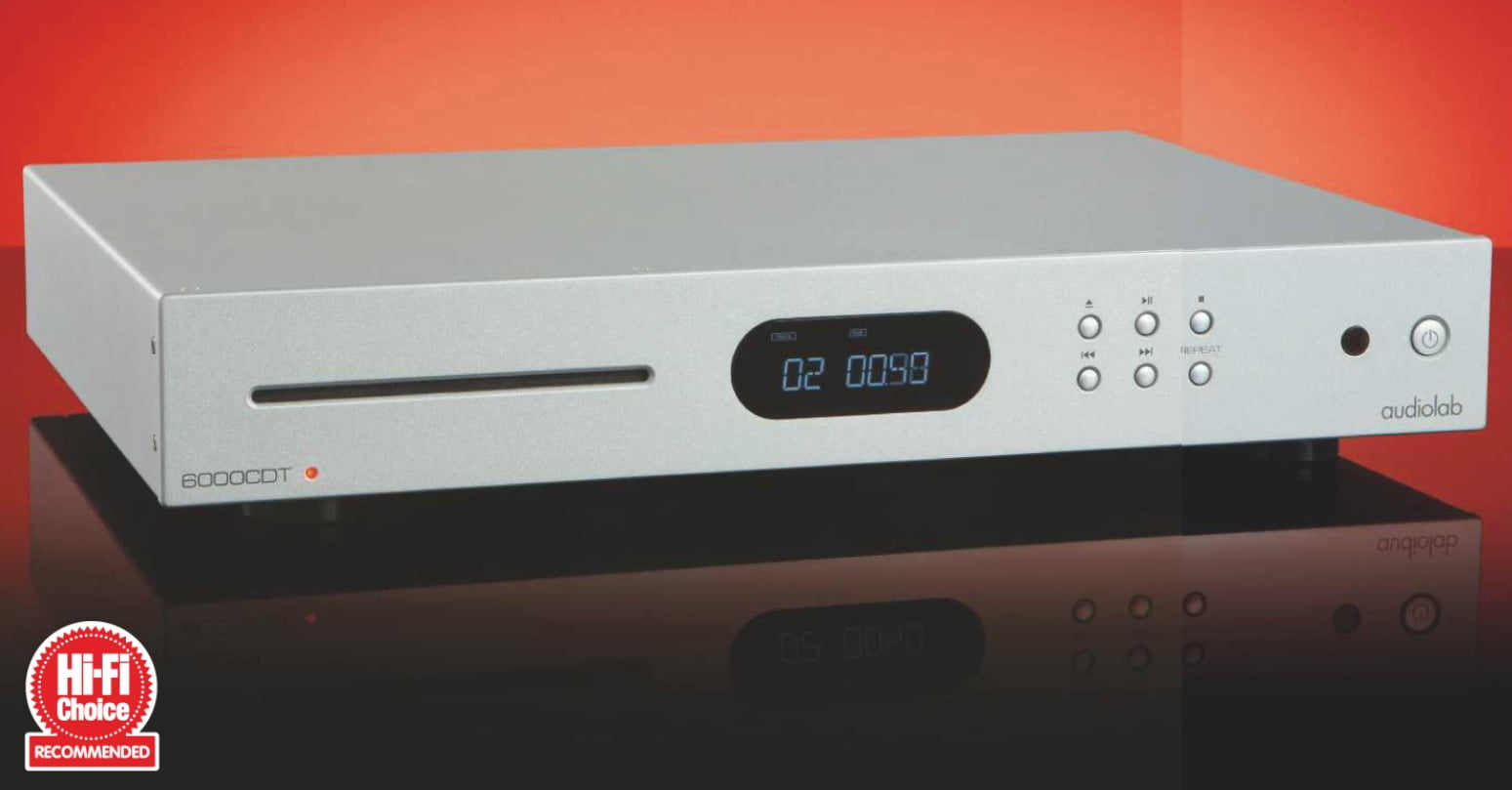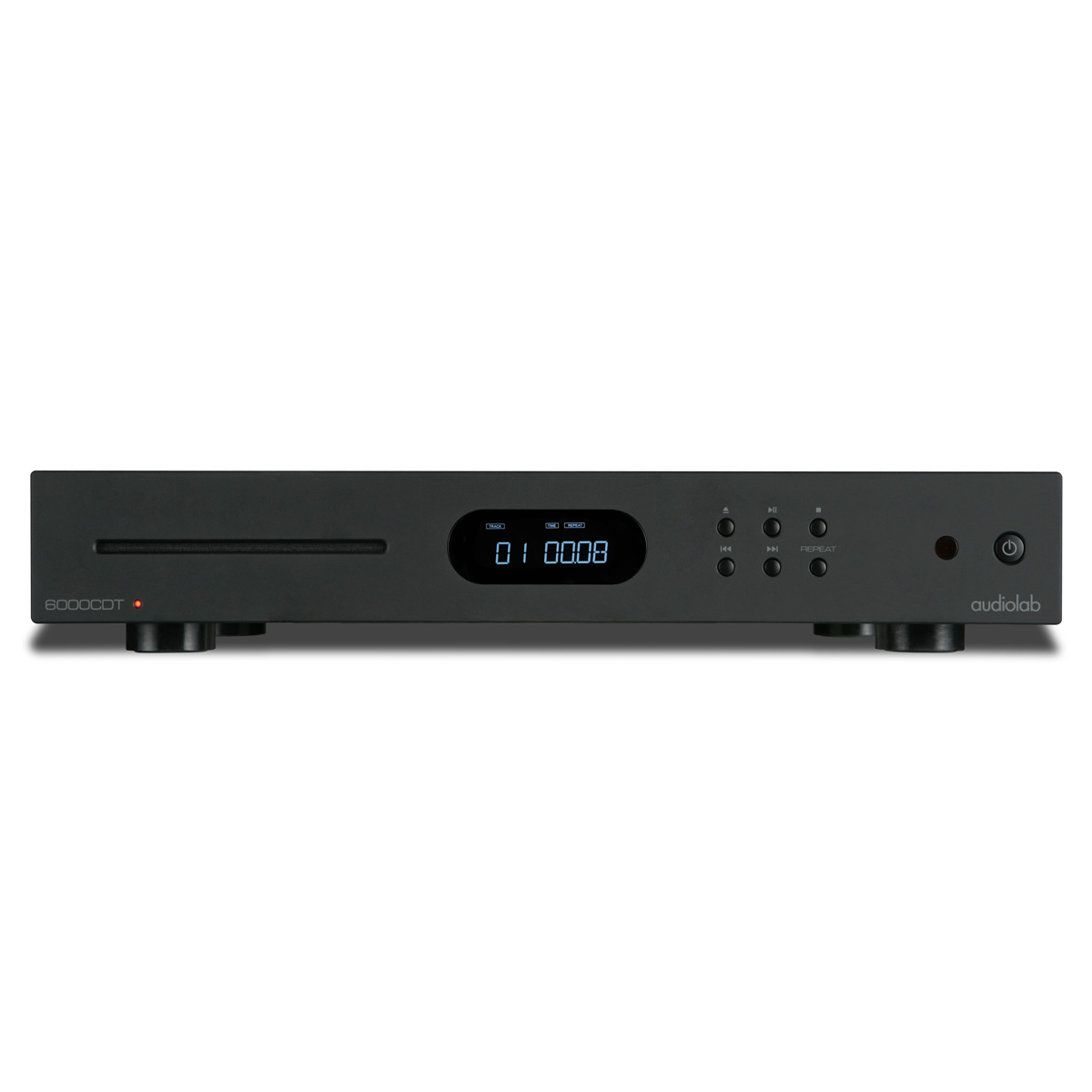Audiolab 6000CDT Review: Department of transport
Audiolab’s 6000CDT is a rarity – a great value CD transport – says David Price.
Funny how fashions come and go. A separate CD transport and DAC was the coolest thing on the planet in the late eighties, almost more impressive than having a brick-sized cellular portable telephone or hot hatchback with the letters GTi emblazoned on the back. Then, ten years later, few seemed interested in this sort of needless extravagance.

Less was more, and some fine-sounding one-box CD players were around, so what was the point? Then, DACs returned to fashion, and we marveled at hi-res for the first time.
A sizeable number of integrated amplifiers now come with built-in DACs – some very good, others not. Audiolab’s new 6000CDT has been built to partner with the excellent 6000A integrated – the company’s starter amp – but I reckon it has wider appeal even than that. It is slim, discreet, slinky, andd sounds very good. If you have a decent DAC, it’s worth considering.
Like its 6000A stablemate, the 6000CDT is built to a price – but has been cost-cut very cleverly. Instead of the beautifully finished aluminum of the more expensive 8300CD (HFC 404), the cheaper range gets painted steel casework and a less expensive display. Interestingly, the company has chosen this route, as many brands would keep the fancy casing and skimp on the internal components, whereas Audiolab has done precisely the opposite.
DETAILS
| Product | Audiolab 6000CDT |
| Origin | UK/China |
| Type | CD transport |
| Weight | 5.4 kg |
| Dimensions (WxHxD) | 445 x 66 x 300 mm |
| Features | – Slot-loading CD mechanism |
| – Digital outputs: 1x optical, 1x coaxial | |
| Distributor | IAG Ltd. |
| Telephone | 01480 447700 |
| Website | audiolab.co.uk |
Whether you choose the silver or black finish, the 6000CDT looks crisp, modern, and purposeful. The slick slot-loading CD mechanism sounds smooth whenever a disc is fed in or ejected. The display is crisp and informative, and a row of buttons to control the transport functions and the on/standby button are all to the right. It’s all so simple and intuitive to use that it’s a real pleasure.
It uses the same transport mechanism as Audiolab’s flagship 8300CD silver disc spinner, mounted inside its own electromagnetically shielded enclosure. It additionally has a read-ahead digital buffer to reduce disc-reading failures, and the master clock is controlled by a temperature-compensated crystal oscillator, which we’re informed makes for very low claimed jitter figures.
The coaxial output is fed from a differential line driver for a high-quality digital data stream. Round the back, it sports an optical Toslink and digital coaxial output, plus trigger sockets, an IEC power-in in, and a main power switch. Audiolab says its power consumption is 15W in use and less than 0.5W in standby mode.
It loads discs smoothly, isn’t noisy while doing so, and then reads the CD’s table of contents speedily. This offers swift track access – maybe not quite up there with a top-class nineties Sony player, for example, but way better than many modem rivals. This feels like a quality product, and not like you’re slumming it in the cheap seats in any way.
There may still be some diehards who insist that “a bit is a bit” and, therefore, all CD transports sound the same, but this certainly is not my experience. Jitter affects the sound subtly, as does poor mechanical isolation and the quality of the power supplies and digital outputs. The 6000CDT is superb for the money and turns into a great performance – not just with its partnering 6000A integrated but with many other DACs that cost multiples of the matching amp’s price.
Sound quality
Scritti Politti’s Perfect Way is a classic slice of eighties pop, not the greatest hi-fi recording I have ever heard. Yet the Audiolab digs deep into what is on the disc to serve a great big soundstage with lots of detail inside. There is a sense of hearing all the various tracks in the mix play along simultaneously, especially via my high-end reference dCS Debussy DAC. It seems able to eke right down into the mix and carry all the different strands forth without tripping over its shadow.
This player has crisp and detailed sound with a controlled yet insightful character
Another impressive facet is its soundstaging. Change’s Lover’s Holiday – some lovely soul/funk from the late seventies – has impressive scale and space. Instruments are precisely located in the stereo mix, and there is a good deal of depth perspective. The Audiolab seems to have a lot of control, putting out an orderly recorded acoustic with everything in its correct place and separated nicely from other strands of the mix. In absolute terms, higher-end transports do better, with a real ‘out-of-the-box’ feeling, but this is still impressive nonetheless.
Rhythmically and dynamically, it’s a good performer, too. Cue up some classic rock from Rush in the form of Red Barchetta, and the 6000CDT delivers a lively and pacy sound with lots going on within the broad three-dimensional canvas. The driving bass guitar is particularly evident, alongside the drummer’s memorable pan rolls and sweeps, keeping to perfectly metronomic timing. Indeed, this transport has a crisp and detailed sound with a controlled yet insightful character that is fun to listen to during the audition period. More expensive designs do better in the bass with greater grip and power, but this Audiolab is no slouch here. The beautifully crisp and delicate yet detailed hi-hat and ride cymbal work is very enjoyable at the other end of the frequency range.
Conclusion
There are no two ways about it: the Audiolab 6000CDT is a CD transport bargain – a true quality item at a price that often doesn’t buy you very much of anything. Everything from its look and feel to the way it plays compact discs is worthy of respect
When you purchase through links on our site, I may earn an affiliate commission. Here’s how it works.
Connections

1 Mains on/off power switch
2 12V trigger in and outputs
3 Optical digital output
4 Coaxial digital output
HOW IT COMPARES
There aren’t many CD transports on sale right now, which nearly puts the Audiolab in a gang of one. Still, there’s always the Cambridge Audio CXC (MFC 401). The Audiolab feels like a classier product; its slot-loading disc mech is nicer than the Cambridge’s wobbly tray, and the whole thing seems swisher. Sonically, there’s not that much in it, but the Audiolab wins with a fraction more detail and a slightly crisper nature. It seems slightly less fussy with discs, too. It wins, but the CXC is great value all the same.












Bought one and ran it 24/7 for 400 hours continuously. I found the sound quite a bit lighter than my Micromega CD3. Missing bass made it sound less dynamic.
I’ve been living with the Audiolab 6000cdt transport for about a month now. Haven’t had this much fun and pure pleasure with a piece of gear in quite a number of years! Been running it in for about three weeks straight 24/7 and I have to say this is the best $500 I have ever invested in a piece of gear. CD’s sound so much better now than my previous expensive one box players. I have the 6000cdt connected to a $99.00 Dac and I honestly would prefer this combination to both of the $3k CD players I used to own. It’s almost scary to think what this transport can do with better and better DAC’s. The sound, timing, clarity and precision makes the Audiolab 6000cdt my personal pick for budget product of the year. Problem is, this transport is only budget in price. It sounds much more expensive than it has a right to!
Thanks for your information 😀
IAG group, the owner of AUDIOLAB, launched a similar cd transport under the name brand name LEAK. also with a slot loader. same price range. would like to know the difference between the two.
If you look at the top sacd/cd players, none use slot-loading mechanism. No normal audiophile is going to risk a sacd/hybrid sacd into a slot-loaded mechanism.
They are used to cut costs of the drawer mechanism and the weakness of the front end with a drawer. Stay away from slot-loading gear; you’re pay dearly for it.
seems the slot load might be better deal , less cost on loading mech , more cost on electronics
Millions of slot loaders are installed in cars, with those extreme hot / cold temperatures where I live in Canada, and the abuse and vibration of a car.
Never an issue in decades, and never heard of anyone with troubles.
Maybe you should try one…